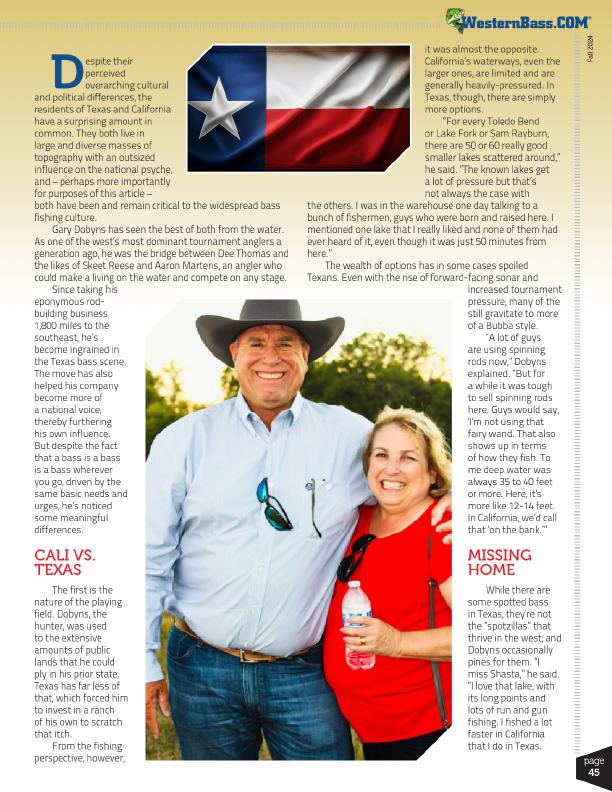
®
D
espite their
perceived
overarching cultural and political differences, the
residents of Texas and California
have a surprising amount in
common. They both live in
large and diverse masses of
topography with an outsized
influence on the national psyche,
and – perhaps more importantly
for purposes of this article –
both have been and remain critical to the widespread bass
fishing culture.
Gary Dobyns has seen the best of both from the water.
As one of the west’s most dominant tournament anglers a
generation ago, he was the bridge between Dee Thomas and
the likes of Skeet Reese and Aaron Martens, an angler who
could make a living on the water and compete on any stage.
Since taking his
eponymous rod-
building business
1,800 miles to the
southeast, he’s
become ingrained in
the Texas bass scene.
The move has also
helped his company
become more of
a national voice,
thereby furthering
his own influence.
But despite the fact
that a bass is a bass
is a bass wherever
you go, driven by the
same basic needs and
urges, he’s noticed
some meaningful
differences.
CALI VS. TEXAS
The first is the nature of the playing field. Dobyns, the hunter, was used to the extensive amounts of public lands that he could ply in his prior state. Texas has far less of that, which forced him to invest in a ranch of his own to scratch that itch.
From the fishing perspective, however,
it was almost the opposite.
California’s waterways, even the
larger ones, are limited and are
generally heavily-pressured. In
Texas, though, there are simply
more options.
“For every Toledo Bend
or Lake Fork or Sam Rayburn,
there are 50 or 60 really good
smaller lakes scattered around,”
he said. “The known lakes get
a lot of pressure but that’s
not always the case with the others. I was in the warehouse one day talking to a bunch of fishermen, guys who were born and raised here. I mentioned one lake that I really liked and none of them had ever heard of it, even though it was just 50 minutes from here.”
The wealth of options has in some cases spoiled Texans. Even with the rise of forward-facing sonar and
increased tournament
pressure, many of the
still gravitate to more
of a Bubba style.
“A lot of guys
are using spinning
rods now,” Dobyns
explained. “But for
a while it was tough
to sell spinning rods
here. Guys would say,
‘I’m not using that
fairy wand. That also
shows up in terms
of how they fish. To
me deep water was
always 35 to 40 feet
or more. Here, it’s
more like 12-14 feet.
In California, we’d call
that ‘on the bank.’”
MISSING HOME
While there are some spotted bass in Texas, they’re not the “spotzillas” that thrive in the west, and Dobyns occasionally pines for them. “I miss Shasta,” he said. “I love that lake, with its long points and lots of run and gun fishing. I fished a lot faster in California that I do in Texas.
Fall 2024
page 45